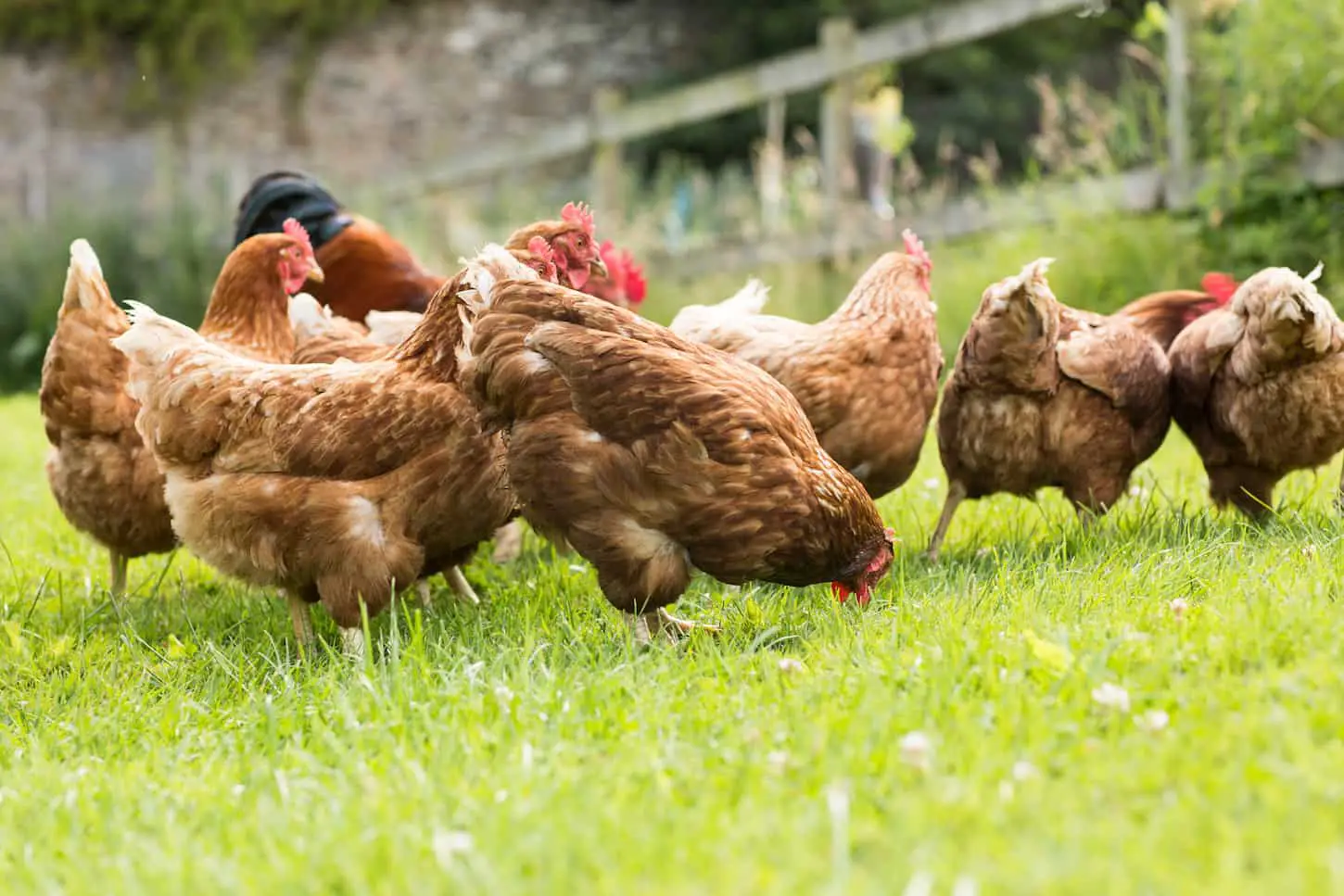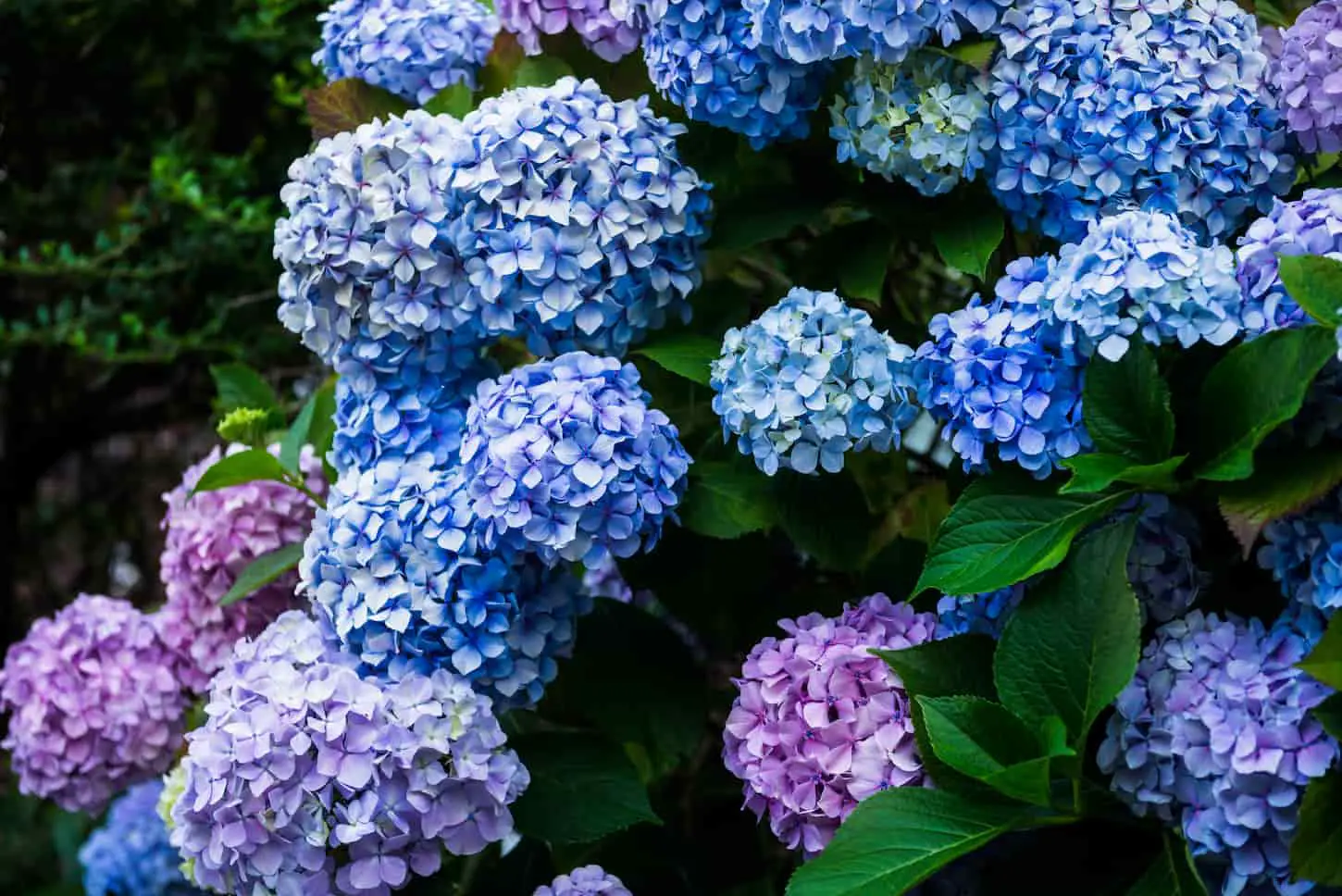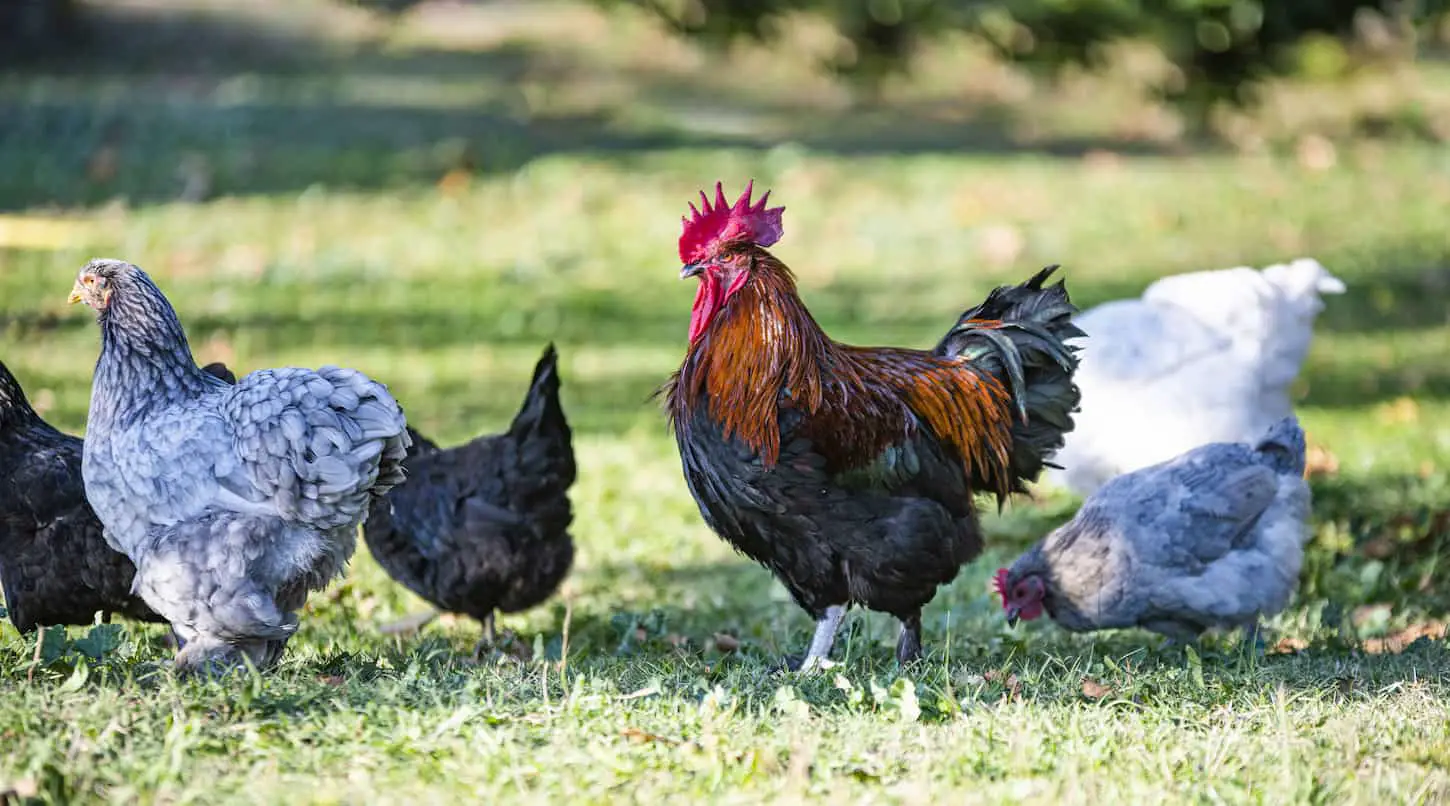We all know that a free-range lifestyle is better for chickens, but this sometimes comes at the cost of your garden. Chickens can destroy a garden or young veggie patch very quickly. In order to strike a balance between the free-range chickens’ lifestyle and the garden, what plants are chicken-proof?
Chickens have good instincts about what food is safe for them, and they generally won’t eat poisonous plants. Most chickens won’t eat certain aromatic plants either, such as mint or lavender because they don’t like the taste.
A bare garden isn’t very attractive or beneficial. So, how can someone with a green thumb still have a green garden with chickens around? Take a look at our complete guide to the plants that chickens won’t eat.

Why is it Good to Have Chickens in Your Garden?
Having chickens in the garden is fantastic for the land and for chickens. Chickens are happier outside where they can scratch around and enjoy the sunshine. Your garden will benefit from a chicken’s natural tilling technique, and chicken manure improves the soil quality.
Chickens are the best form of natural pest control in a garden because they love eating bugs and larvae. They also turn plants into nutritious mulch.
When chickens are given access to a compost heap, they will gladly turn it over. Just make sure there’s nothing on it that’s unsafe for chickens before letting them have it.
When chickens range freely, they have a more diverse and nutritious diet. It’s also good for their well-being because they get to practice their natural habits, such as scratching and dust bathing. Free-range chickens produce tastier and more nutritious eggs because they’re healthy and happy.
Many chicken keepers give their chickens an outdoor run to scratch around in. Some chicken runs are fixed to the ground, while others are mobile and easy to move around. Mobile runs are good because chickens strip a run of its greenery very quickly.
Some keepers let their chickens have access to all of their land. If this is you, plan on planting chicken-resistant plants to keep the greenery in the garden.
Are There Plants Chickens Won’t Eat?
Chickens won’t eat tall plants they can’t reach, and they will also avoid eating poisonous plants. However, a hungry malnourished chicken will eat whatever it can find, including poisonous plants.
All chickens are different; some chickens will eat what other chickens usually leave alone. Also, if there’s nothing else to eat, chickens will eat almost anything to survive. As far as garden plants go, there are plenty of chicken-resistant plants that most chickens don’t like the taste of.
It’s a good idea to test a plant out first to see if the chickens will eat it. Buy a small specimen and leave it out with your chickens. If the chickens eat it, it’s no great loss. If they don’t, congratulations – you’ve got yourself a chicken-resistant plant.
Groundcover Plants Chickens Won’t Eat
Chickens won’t eat groundcover plants they don’t like the taste of, like creeping mint or rosemary. Some groundcover plants, such as low blueberry bushes, are edible for chickens. Chickens will eat the fruit from these without destroying the plant.
Groundcover plants are good if you have chickens because they’re dense, quick-growing, and protect the soil. They will help bring some greenery to the garden, and some groundcovers are aromatic and produce flowers.
For some ideas of suitable ground cover plants that chickens won’t eat, take a look at the list below.
** Poisonous plants will have an asterisk. **
- Blueberry (low bush) – Chickens will eat the berries without killing the plant.
- Creeping mint – Chickens usually don’t like the taste of mint.
- Creeping thyme
- Feverfew – Feverfew is a natural insect repellent
- Ground cover roses – Chickens might eat the rose petals, but they usually leave the plant alone.
- Juniper * – Large amounts of juniper berries can be toxic for chickens, but chickens usually won’t eat too many of them.
- Sweet woodruff
- Trailing Rosemary – Rosemary is a natural insect repellent, and chickens generally don’t like the taste.
Shrubs That Chickens Won’t Eat
Chickens won’t eat tall shrubs they can’t reach, and they generally won’t eat aromatic shrubs. Shrubs are tough and woody, like small trees, and chickens seem to leave most shrubs alone.
Shrubs are great for a chicken run because they provide shade and shelter for chickens. However, chickens will eat young immature shrubs because they’re more palatable. So, all young shrubs must be protected from chickens.
Here’s a list of some chicken-friendly shrubs you can plant in your garden.
** Poisonous plants will have an asterisk. **
- Barbery
- Breath of Heaven
- Camelias
- Lavender – Has insect repellent properties, and the smell might be soothing to chickens.
- Lilac
- Pittosporum
- Plumbago *
- Rose
- Rosemary
- Spiraea
- Viburnum
- Woody Salvias
Perennials That Chickens Won’t Eat
Chickens will usually avoid toxic perennials such as peonies and lilies. Chickens also don’t seem to like the taste of fragrant perennials such as geraniums, or leafy plants like hostas.
Perennials vary in shapes and sizes; they grow back each year and provide lots of greenery and flowers. Here are some perennial plants that chickens generally won’t eat.
** Poisonous plants will have an asterisk. **
- Black-eyed Susan
- Calla Lily and Daylily * – Most lilies are toxic to chickens, especially peace lilies and lilies of the valley.
- Geranium
- Hostas
- Peony *
- Shasta Daisy *
- Yarrow
Edible Plants That Chickens Won’t Eat
Chickens won’t eat edible plants that are unpalatable such as leeks and they don’t like the taste of certain herbs such as chives. Furthermore, some edible plants such as potatoes are poisonous to chickens, so chickens usually avoid these.
Chickens are omnivores which means they can eat most of the food in their environment, including plants, insects, and even small mammals. However, there are some edible plants chickens won’t eat, such as the ones listed below.
** Poisonous plants will have an asterisk. **
- Asparagus – While it’s a plant in the ground.
- Avocado * – Avocado is poisonous to chickens, particularly the leaves, skin, and pit.
- Beans and legumes * – raw beans and legumes are poisonous to chickens.
- Garlic – Garlic is good for chickens’ health but they generally leave the plant alone.
- Herbs – There are lots of herbs the chickens don’t like eating such as chives, tarragon, sage, and mint.
- Leeks
- Nightshade fruits and vegetables * – Including potatoes, eggplant, bell pepper, and tomato.
- Onions * – Onions are toxic to chickens, and they can make their eggs taste bad.
- Rhubarb * – Rhubarb leaves are highly toxic to chickens.
- Squashes – Most chickens aren’t interested in mature squash plants

What Plants Do Chickens Hate the Most?
Most chickens hate plants that are poisonous to them and will usually leave things like foxglove well alone. Toxic plants are the most chicken-resistant plants. However, it can be dangerous if a chicken eats them.
Most of the time, a well-fed chicken won’t eat poisonous plants, but if for some reason your chickens do get a taste for a harmful plant, remove it. The best way to prevent chickens from eating poisonous plants is by keeping them well fed.
Here’s a list of the plants that chickens hate the most.
** Poisonous plants will have an asterisk. **
- Azaleas *
- Angels trumpet *
- Bamboo – The cane is too hard for chickens to damage, but they can enjoy the leaves.
- Boxwood *
- Bulbs – Daffodils, tulips, and iris – Be careful your chickens don’t dig up the bulbs or eat the first green shoots in spring.
- Castor bean *
- Daphne
- Ferns – Be careful with Bracken Fern, it can cause Bracken Fern Poisoning in chickens.
- Foxglove *
- Hydrangeas *
- Holly
- Honeysuckle
- Jasmin
- Lobelia
- Lupine *
- Milkweed *
- Morning Glory * – Only the seeds are poisonous
- Nightshade *- There are over 70 types of nightshade, including Deadly Nightshade. All of them are highly toxic to chickens.
- Periwinkle
- Poison ivy
- Rhododendrons
- St John’s Wort *
- Wallflower
- Wisteria *
Signs of Poisoning in a Chicken
If a chicken has eaten something toxic, the symptoms may be mild or severe depending on what they’ve eaten. A poisoned chicken will become lethargic and lose its appetite. They may also drink excessively and have discolored green droppings.
Poisons can kill a chicken pretty quickly, while others act more slowly. Long-term signs of poisoning include weight loss and the chickens will be in poor condition.
If you’re worried about your chickens’ health or think they’ve eaten a poisonous plant, don’t hesitate to get in touch with your vet.
What Can You Plant Around a Chicken Run?
The best things to plant around the chicken run to give them shade and cover the ground are chicken-resistant plants. It’s a good idea to have plants around the chicken run for the chickens to eat and forage from.
Many plants such as fennel attract insects to lay larvae – which chickens love to eat. Oatgrass, white clover, and leafy greens will provide plenty of forage and lots of extra nutrition around the chicken run.
Chickens like to eat herbs too. Many herbs have therapeutic properties for a chicken, such as a thyme, which is antibacterial. Most chickens love to eat comfrey, thyme, sage, and oregano.
For some pretty color around the run, plant flowers such as dandelions, marigolds, and nasturtiums, these have medicinal and antiparasitic properties. Or, grow some sunflowers and feed the dried seeds to your chickens as a treat.
Berries make a delicious and nutritious treat for chickens as well as vine fruits like watermelon and grapes. Chickens will love helping themselves to the fruit. You can also grow fruits and vegetables such as cucumber, corn, peas, squashes, and pumpkins for the chickens to eat.
It’s good to plant a mix of edible and chicken-resistant plants around a chicken run. However, before putting a new plant around the run, make sure to introduce it to the chickens slowly. Chickens might get ill if they eat too much of a new plant all at once.
Things You Should Never Feed To Chickens
Chickens can eat most foods, including meat and animal products. However, some foods are highly toxic to chickens and can make them very ill or even kill them. You should never feed chickens moldy or rotten food or vegetables from the nightshade family.
Take a look at this important list below of the things you should never feed to chickens.
- Alcohol, caffeine, or soft drinks
- Moldy or rotten food
- Processed, salty, fatty, or fast food.
- Plants from the Nightshade Family – including bell pepper, tomato, eggplant, and potatoes
- Raw onions
- Avocado
- Chicken meat
- Uncooked or dried beans
- Rhubarb
- Cherry, apricot, plum or peach pits, and apple seeds
- Unshelled nuts
- Chocolate
- Wild mushrooms
Want to know more about the foods you can and cannot feed your chickens? Read my article What Chickens Can and Cannot Eat: Complete Guide next.
How Do I Keep Chickens Out of My Garden?
In order to grow veggies or plants that chickens love to eat, plant them in a place where the chickens can’t get to them. Make a fenced-in garden or put plants in raised beds or boxes to keep them safe from chickens.
To keep chickens out of the garden with a fence, make sure it’s at least 2 or 3 feet high and without a top bar to land on. Chickens usually won’t be able to jump over a fence this tall. If there are some good fliers in the flock, you might want to make the fence taller, though our best fliers can easily jump over a 4-foot fence. Thankfully, they don’t jump the 6-foot vinyl fence!
Also, make sure the fence runs right down to the ground and that it’s narrow enough so the chickens can’t squeeze through.
Another option is to cover the veggie garden with chicken-proof netting, or use raised beds at least 2 feet high. Alternatively, you could grow plants in hanging baskets to keep them out of a chicken’s reach.
If you need to give your chickens access from one area to another, but you don’t want them getting into the garden, use chicken fencing to create tunnels between their allowed spaces. That way, they can get where they need to, but they can’t get to your garden.
Best Products Plants and Chickens in Your Garden
Need some easy products to keep your chickens and garden separate but happy? Here are some great products to get your ideas coming. Plus, they’re available online. Now, I’m a big believer in buying locally, but I also like using online ideas to get me thinking.
- Use a raised-bed garden box to keep your chickens out of favorite herbs or produce (like this one on Amazon). You could even put some chicken wire underneath these to give them some additional covered areas without letting them get to the top of the planter!
- Garden netting (like this set on Amazon) can be a great way to protect produce from chickens and other produce-eating animals that you don’t want to get into the garden.
- Keep your chickens in approved locations with an enclosed run with a tarp cover. This one, on Amazon, comes in several sizes, which is awesome.
- Make use of hanging planters, like these on Amazon, to keep various plants out of reach of your hens.

Key Takeaways and Next Steps
It’s good to have plants and shrubs around to provide shade and shelter for the chickens. However, chickens will eat almost anything so choose plants for the garden or chicken run that they don’t like to eat. Grow plants that enrich the chicken’s diet such as berries.
If there are poisonous plants around, make sure the chickens are always well fed so they don’t eat them. If you do see chickens eating poisonous plants, remove the plants or make them inaccessible to the chickens.
Want to know more about the foods you can and cannot feed your chickens? Read my article What Chickens Can and Cannot Eat: Complete Guide next.
Or get ready to take your flock commercial feed-free by knowing what their nutritional needs are. I’ve broken down everything they need to eat in this article here: How to Raise Chickens Without Feed (And Why it’s Better!). Even if you don’t go all-natural, it’s a great read so you understand what to feed (and what not to feed) your chickens, so go give it a read next!
Resources
Learning from your own experience is essential, but learning from others is also intelligent. These are the sources used in this article and our research to be more informed as homesteaders.
- Adamafio, N. A. “Theobromine Toxicity and Remediation of Cocoa By-Products: An Overview.” Journal of Biological Sciences, vol. 13, no. 7, 2013, pp. 570–76. Crossref, doi:10.3923/jbs.2013.570.576.
- “Dummies – Learning Made Easy.” Dummies, www.dummies.com/article/home-auto-hobbies/hobby-farming/chickens/chickens-and-plant-toxicity-162864. Accessed 3 Feb. 2022.
- Dummies, www.dummies.com/article/home-auto-hobbies/hobby-farming/chickens/handy-herbs-to-benefit-your-chicken-garden-165337. Accessed 3 Feb. 2022.
- Grzybek, Maciej, et al. “Evaluation of Anthelmintic Activity and Composition of Pumpkin (Cucurbita Pepo L.) Seed Extracts—In Vitro and in Vivo Studies.” International Journal of Molecular Sciences, vol. 17, no. 9, 2016, p. 1456. Crossref, doi:10.3390/ijms17091456.
- Jankowska, Beata, et al. “Effect of Intercropping White Cabbage with French Marigold (Tagetes Patula Nana L.) and Pot Marigold (Calendula Officinalis L.) on the Colonization of Plants by Pest Insects.” Folia Horticulturae, vol. 21, no. 1, 2009, pp. 95–103. Crossref, doi:10.2478/fhort-2013-0129.
- “List of Plants in the Family Solanaceae | Genera and Species.” Encyclopedia Britannica, www.britannica.com/topic/list-of-plants-in-the-family-Solanaceae-2026039. Accessed 27 Jan. 2022.
- Llc, AnimalDVM. “PoultryDVM | Nontoxic Plants A-Z Database.” PoultryDVM, www.poultrydvm.com/nontoxic.php. Accessed 3 Feb. 2022.
- “Toxic Plants to Chickens A-Z.” PoultryDVM, www.chickendvm.com/toxic.php. Accessed 3 Feb. 2022.
- “Plants ·.” California Poison Control System (CPCS), calpoison.org/topics/plant#nontoxic-common . Accessed 3 Feb. 2022.
- Porter, Robert. “Poisonings in Poultry.” MSD Veterinary Manual, 24 Jan. 2022, www.msdvetmanual.com/poultry/poisonings/poisonings-in-poultry.
- Roberts, Victoria. “The Basics of Keeping Back Yard Chickens.” Veterinary Nursing Journal, vol. 24, no. 9, 2009, pp. 18–21. Crossref, doi:10.1080/17415349.2009.11013124.
- Wang, Shuhao, et al. “Effects of Dietary Marigold Extract Supplementation on Growth Performance, Pigmentation, Antioxidant Capacity and Meat Quality in Broiler Chickens.” Asian-Australasian Journal of Animal Sciences, vol. 30, no. 1, 2016, pp. 71–77. Crossref, doi:10.5713/ajas.16.0075.
Thank you for all your research…
You’re welcome! It helps with our own chickens, so I’m happy to share what we’ve found.